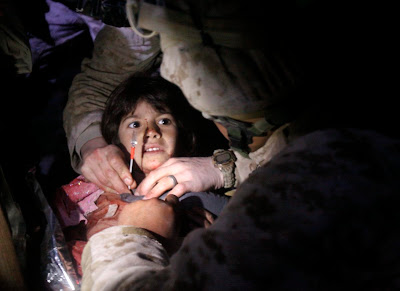
Her older brother knew where to turn when he needed help.
HELMAND PROVINCE, Afghanistan – When a 4-year-old Afghan girl named Azerha was struck by shrapnel Feb. 10, her brother Quassiam did the only thing he could think of – approach a group of armed Marines miles away and ask for medical assistance.
He drove his sister east from near the city of Marjah toward an intersection known as "Five Points," a key intersection of roads connecting northern Marjah with the eastern areas of Helmand province. Marines and Sailors of Charlie Company, 1st Battalion, 3rd Marine Regiment, seized the Five Points area the day prior during a helicopter-borne assault.
Azerha had been struck in the chest by a fragment of metal from an improvised explosive device using 82 mm mortar rounds which detonated near her home. The wound had caused bleeding and breathing problems for Azerha by the time she arrived, Navy corpsman reported as they examined and began to stabilize her for a medical evacuation to a medical trauma facility.
"When the car came and I approached the vehicle, I saw the blood coming from her chest," said Petty Officer 1st Class Eric E. Casasflores, 30, an independent duty corpsman assigned to Charlie Co., 1/3. "I could see there was a small wound where something had penetrated. Once we put the dressing on, she began having more trouble breathing and I determined we needed to medevac her."

While waiting inside the walls of a farming compound for a helicopter to arrive, corpsmen treating Azerha found that her lung was beginning to collapse. Between the time her flight was scheduled to arrive and her worsening symptoms, Casasflores, the senior corpsman on scene, decided they had to act quickly to stabilize their patient.
"Her vitals began to drop while we were waiting for the medevac and we had to do a needle decompression," said Casasflores, who was born in Lima, Peru, but calls Newark, N.J., home. "She wasn't bleeding very badly, but with almost any trauma to the chest, you have to do a needle decompression [to allow the lung to expand again]."
"She took it extremely well for a small child," said Petty Officer 3rd Class Adam E. Neep, a field hospital corpsman with Weapons Company, 1/3. "For taking a big needle through her chest, she barely fussed."
Once the needle was in, Azerha began to breathe easier and she and her brother seemed to relax. As Azerha began to stabilize in the open field, the corpsmen decided to move her back into their compound's aid station and redress her wounds. They wrapped her in emergency blankets to keep her warm and Neep talked to her through an interpreter to keep her awake and alert to help ward off shock.
Only minutes before the helicopter's arrival, Azerha's vitals began to wane again, and Casaflores decided to perform a second decompression. Azerha winced at the momentary pain of the needle but quickly calmed and her vital signs stabilized. As soon as the helicopter touched down, corpsmen rushed Azerha on a litter for evacuation. Quassiam joined his sister on the flight and will likely remain with her throughout her treatment.
"The quick reaction from the Marines and corpsmen and getting her the medevac was what made the difference for her," said Casasflores after the helicopter lifted off. "I foresee a good prognosis for her coming back and playing with her brother back at home."
For Neep, 22, from Ceres, Calif., treating Azerha struck a personal chord with him after she departed. He said seeing the older brother with blood on his clothes helping his injured sister made him think of his own sister back home, who is 10 years younger than he.
"I'm glad we were here to save her life," said Neep. "If she didn't get the proper medical attention, she would have died. It's that simple."
Casasflores credits the success to the Marines and his corpsmen on scene.
"Our corpsmen did well treating her," said Casasflores. "Everyone stayed calm and things moved smoothly. That's exactly what you want in a trauma situation."
Navy medical officers report they performed surgery on Azerha upon her arrival and removed a piece of shrapnel from near her heart. They expect her to make a full recovery.
h/t Phibian

No comments:
Post a Comment